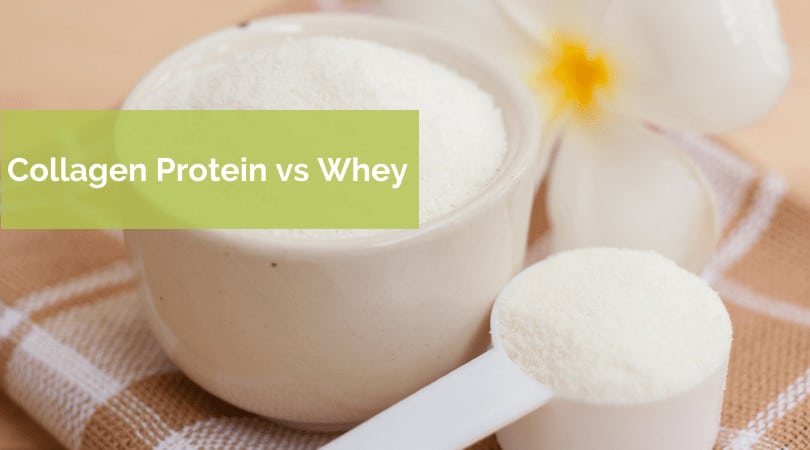
During pregnancy, your protein needs are greatly increased to meet the new demands on the body. For some, getting protein through the diet can be difficult and protein supplementation may be necessary. Two of the main protein powder supplements you may encounter are collagen protein and whey protein, and you may wonder which is best for you.
This article discusses the differences between whey vs collagen protein, the benefits of each, and reasons why one type of protein powder may work best for you.
Collagen Protein
Collagen is the most abundant protein found in the human body. It is an essential protein that makes up connective tissue and is present in the bones, skin, nails, hair, ligaments, and tendons.
Collagen has a triple helix structure and is naturally produced by our bodies through the combination of the amino acids glycine and proline, vitamin C, and copper. During pregnancy, collagen has several important roles to support maternal and fetal health. It supports a healthy immune function, skin elasticity, gut health, and helps the strength of your joints and ligaments. Although collagen is not a complete protein because of its lack of tryptophan, taking a collagen supplement during your pregnancy can still help you meet your increased protein needs.
Taking a further look into collagen, there are two major sources used for collagen protein: terrestrial collagen and marine collagen.
Terrestrial Collagen
Terrestrial collagen is collagen sourced from land-based animals, such as pigs or cows. This collagen typically comes from the boiled bones and skin of these animals.
Terrestrial collagen is primarily made up of Type 1 and Type 3 collagen. Type 1 collagen is the most abundant type of collagen in the body, and is best for skin health and supporting other types of connective tissues. Type 3 collagen is the second most abundant collagen type in the body and is often found in areas like the muscles, uterus, intestines, and blood vessels. Type 3 collagen typically supports the beneficial actions of Type 1 collagen.
Marine Collagen
Marine collagen comes from the bones, skin, and scales of fish and other aquatic species, and can be sourced from fish byproducts. While it has a similar composition compared to terrestrial collagen, marine collagen is primarily made up of Type 1 collagen, the most beneficial type of collagen. Marine collagen also has a lower molecular weight, so it is absorbed better in the body compared to terrestrial collagen. Certain marine collagen extractions can have higher amounts of glycine and hydroxyproline compared to terrestrial collagen.
Because marine collagen is higher in glycine, it may have higher antioxidant activity compared to terrestrial collagen. Glycine is one of the three amino acids used to make glutathione, the major antioxidant produced by the body.
Marine collagen may be a better choice of collagen for several reasons. People following certain religions may not be able to use collagen sourced from pigs or cows, and can use marine collagen as an alternative. Terrestrial collagen may pose health risks due to the risk of spreading animal diseases like bovine spongiform encephalopathy (also known as mad cow disease) or foot-and-mouth disease. Given the nature of animal agriculture and its impact on the environment, marine-sourced collagen may even have a lower environmental impact than terrestrial collagen.
Whey Protein
Whey is one of the two major proteins that can be isolated from dairy milk. It is a complete protein, meaning that it contains all nine essential amino acids in adequate amounts. Whey protein is known to be a good source of the branched chain amino acids leucine, valine, and isoleucine. These amino acids are important for muscle growth, exercise performance, and muscle recovery.
When looking at the benefits of whey vs collagen protein, whey protein has some advantages of its own. Whey protein is beneficial for body composition, in particular helping support muscle growth. A 2018 meta-analysis found that in women, whey protein supplementation helped improve body composition by increasing lean protein mass without changing fat mass.
Whey protein also supports detoxification and antioxidant production. Studies find that supplementation with whey protein can help reduce some markers of inflammation. Whey also contains cysteine, an another amino acid used in the production of glutathione.
Whey protein concentrate can still contain trace amounts of lactose, so it can cause digestive issues in people with lactose intolerance.
Collagen Protein Powder vs Whey
When choosing a protein powder to support your health, consider what benefits you want to experience. You may prefer collagen protein vs whey protein if you’re looking for support for your joints, smoother skin, or support for your gut and immune system. Alternately, whey protein could be the better choice if you’re looking for a complete protein and muscle growth.
FAQ
Is collagen better than whey protein?
All types of protein have their own strengths, and certain proteins may be better for you depending on the function you need. Collagen is a better protein source for injury recovery, gut health, skin health, and and connective tissue support compared to whey protein. Taking a collagen supplement may also cause fewer digestive issues compared to whey.
Can you build muscle with collagen protein?
Collagen is a protein that has amino acids necessary for muscle growth. While it may not help muscle growth as quickly as whey protein, research finds that collagen can still be effective for muscle growth.
Is collagen protein as good as regular protein?
Collagen is an incomplete protein compared to whey protein, but it is still a good source of amino acids and has beneficial health properties.
References
- https://www.ncbi.nlm.nih.gov/pmc/articles/PMC7294936/
- https://pubmed.ncbi.nlm.nih.gov/28174772/
- https://www.ncbi.nlm.nih.gov/pmc/articles/PMC6891674/
- https://www.ncbi.nlm.nih.gov/pmc/articles/PMC6213755/
- https://onlinelibrary.wiley.com/doi/10.1002/cbdv.201700557
- https://pubmed.ncbi.nlm.nih.gov/27292783/
- https://pubmed.ncbi.nlm.nih.gov/29688559/
- https://pubmed.ncbi.nlm.nih.gov/25671415/
- https://pubmed.ncbi.nlm.nih.gov/18796312/
- Persistent Tiredness and Chronic Fatigue: Causes and Symptoms - February 27, 2024
- Can A Protein Shake Replace A Breakfast Meal? - March 2, 2023
- Glutamine After Surgery: Does It Help With Recovery? - February 17, 2023





